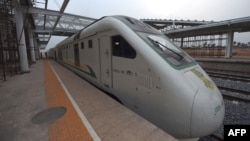A Chinese official in Nigeria says Beijing plans to invest over $300 billion in Africa to increase African exports and help close the large trade gap with China. China's plans for more investment in Africa have been welcomed by some, but critics worry about Africa's growing debt with Beijing.
The recent signing of a multi-billion-dollar partnership between China and Africa marks a major step in China’s effort to spend more money in Africa in nine industrial sectors, including trade, digital innovation, medical, poverty reduction, culture and peace and security.
A Chinese official, China Africa Business Council head Diana Chen, signed a memorandum of understanding with Lagos Chamber of Commerce officials last week in Lagos.
Chen said the $300 billion will be invested in Africa over the next three years.
Many experts welcome the development and say it could increase the local manufacturing and export capacity of indigenous Nigerian and African brands.
Charles Onunaiji is the director of the Center for China Studies in Abuja.
"It's not just in Lagos, it's been holding across Africa. There have been discussions of the new opportunities of China-Africa cooperation. The Lagos meeting was one of the follow-ups on that very important meeting in Dakar, where the Chinese president offered nine programs to drive China-Africa cooperation to the next level. For me, this is a very important landmark in China-Africa cooperation," he said.
China is Africa's biggest trading partner, with over $170 billion annually in trade volume, surpassing the United States and Europe. Nigeria is one of China’s largest trading partners in Africa.
Onunaiji said the new partnership is expected to improve Africa's trade with China, which analysts say is lopsided.
"China is responding to some of these concerns by giving more opportunities to Africa to access her market," he said.
Chinese officials say the new partnership will see China establish special economic zones to accept more imports from Africa.
The president of the Nigeria Private Sector Alliance, Adetokunbo Kayode, said he worries the new partnership could further deepen Africa’s debt with China.
"Many African countries have sleep-walked into the debt trap. They're already there, and it's very obvious, because the facilities they've taken from several countries, including China, is such that they do not have the wherewithal to pay back. Secondly, the contracts are end to end," he said.
Kayode said even though Bejing is investing heavily in Africa, Africans are not often part of the execution, creating a knowledge gap.
Experts say the success of the Chinese partnership will be dependent on favorable trade policies that will be drafted among China and African countries.
But Kayode has this to say, "What is our trade policy with China? In spite of my maybe fairly advantaged position in Nigeria, I've not seen any clear document showing the nitty gritty of Nigeria's trade policy with China. I've not seen specific policies on areas like, for instance, how you drive the local contents of this multibillion-dollar contract."
Since 2018, Chinese authorities began hosting the China-Africa Economic and Trade Expo in Changsha City in the central China province with the stated aim of exposing African products to the Chinese market.
While more African businesses may try to meet a more welcoming Chinese market for their products, many will be watching to see how the new partnership changes the status quo.
Editor's note: This story was revised to correct the amount of China's annual trade with Africa.




